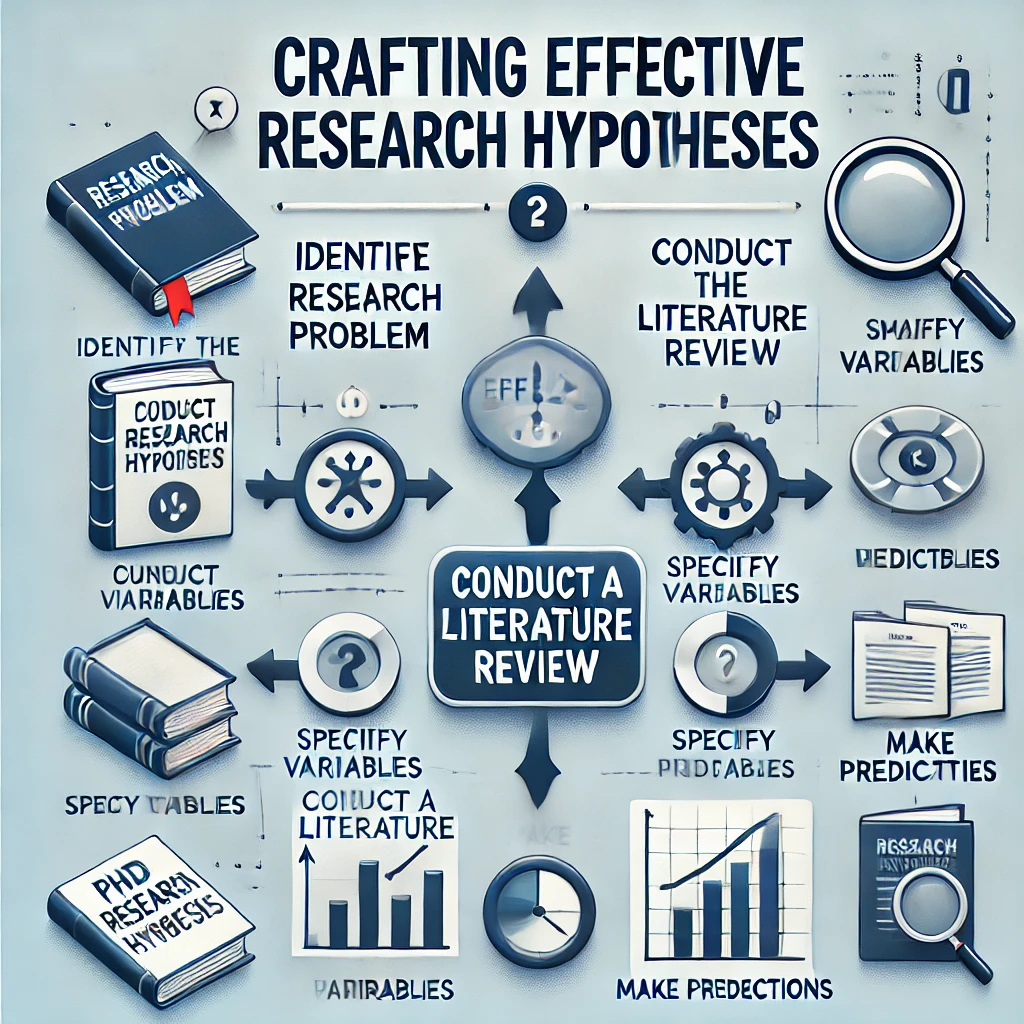Crafting Effective Research Hypothesis: Essential Insights for PhD Scholars
Crafting a research hypothesis is a fundamental aspect of scholarly research, especially for PhD scholars, as it provides a clear, testable prediction about the expected outcomes of a study. A well-defined hypothesis guides the research process, ensures methodological rigor, and helps in drawing meaningful conclusions. At every stage, PhD research assistance can provide expert guidance to enhance the quality and clarity of your hypothesis development.
What is a Research Hypothesis?
A research hypothesis should start with a clear and specific statement that outlines the anticipated relationship between variables. For example, in psychology, if a researcher is investigating the impact of mindfulness meditation on stress, they might propose: "Individuals who practice mindfulness meditation daily for eight weeks will report significantly lower levels of stress compared to individuals who do not engage in meditation." Our PhD thesis writing services can assist you in formulating such hypotheses, ensuring they are testable and aligned with your research goals. This hypothesis specifies the independent variable (mindfulness meditation) and the dependent variable (stress levels).
Education
Similarly, in educational research, suppose a study is examining the effects of gamified learning on student engagement. A relevant hypothesis could be: "Students participating in gamified learning activities will exhibit higher levels of engagement and motivation compared to students who receive traditional instruction." This hypothesis defines the independent variable (gamified learning activities) and the dependent variable (engagement and motivation). It can be tested through observational studies or surveys and falsifiable if the gamified learning does not lead to the expected increase in engagement and motivation.
For instance,
Hypothesis: "Students who use interactive digital tools for studying will achieve higher grades in mathematics compared to students who use traditional study methods."
- Independent Variable: Type of study tool (interactive digital tools vs. traditional study methods)
- Dependent Variable: Mathematics grades
Medicine
In medical research, consider a study focused on evaluating a new weight loss drug. An example of a hypothesis might be: "Patients who use the new weight loss drug will achieve a greater reduction in body mass index (BMI) compared to patients receiving a placebo." This hypothesis clearly predicts that the new drug (independent variable) will result in a reduction in BMI (dependent variable). It is testable through clinical trials and falsifiable if the drug does not produce the anticipated weight loss.
Environmental Science
In environmental science, suppose you are investigating the impact of urban green spaces on mental health. A suitable hypothesis could be: "Residents living within 500 meters of urban green spaces will report better mental health outcomes compared to residents living further away from such spaces." This statement predicts a relationship between proximity to green spaces (independent variable) and mental health outcomes (dependent variable). When choosing a dissertation topic, selecting one that allows for measurable outcomes and hypothesis testing is essential for meaningful research.

To craft an effective research hypothesis, follow these steps:
- Identify the Research Problem: Begin by clearly defining the research problem or question. Understanding the focus of your study helps in formulating a precise hypothesis.
- Conduct a Literature Review: Reviewing existing research helps understand current knowledge and identify gaps. This background research is essential for refining your hypothesis and ensuring it addresses a relevant issue. Our PhD literature review writing service supports this crucial step.
- Specify Variables: Clearly define the independent and dependent variables in your hypothesis. The independent variable is the factor you manipulate or test, while the dependent variable is the outcome you measure. For example, if studying the effect of a new teaching method, the independent variable could be the method itself, and the dependent variable could be student performance.
- Make Predictions: Based on your understanding and existing research, make a specific prediction about the expected outcome. This prediction should be grounded in theory or previous empirical findings.
When crafting a hypothesis, be mindful of common pitfalls:
- Overly Broad Hypothesis: Hypotheses that are too general can be difficult to test effectively. Ensure your hypothesis is specific and focused to provide clear direction for your research. Our PhD proposal help guides you in refining your hypothesis. For example, rather than stating "Teaching methods affect learning," specify "Students using interactive teaching methods will have higher test scores compared to those using traditional methods."
- Lack of Clarity: A hypothesis must be clearly stated and easily understood. Ambiguous or vague hypotheses can complicate the research process and lead to inconclusive results. Clearly articulate your hypothesis to ensure it guides your research effectively.
- Unfalsifiable Hypothesis: Ensure your hypothesis can be empirically tested and potentially proven false. Hypotheses that cannot be disproven do not align with scientific principles and can undermine the validity of your research. For instance, a hypothesis like "All educational interventions improve student outcomes" is too broad and not falsifiable. Instead, focus on a specific intervention and its measurable impact.
A well-formulated hypothesis plays a crucial role in guiding the research design and methodology. It helps in selecting appropriate methods and tools for data collection and analysis. By providing a clear direction, a strong hypothesis ensures that the research aligns with its objectives and contributes meaningfully to the academic discourse.
Conclusion: Why a Strong Hypothesis Matters
In summary, for PhD scholars, mastering the art of crafting a precise, testable, and falsifiable hypothesis is essential for conducting rigorous and impactful research. We at PhD Research Assistance ensure clarity, testability, and falsifiability, researchers can design studies that offer valuable insights and advance knowledge in their fields. Whether in psychology, education, medical research, or environmental science, incorporating tools like NVivo Qualitative Data Analysis supports a well-defined hypothesis and is foundational for producing meaningful and impactful scholarly work.
